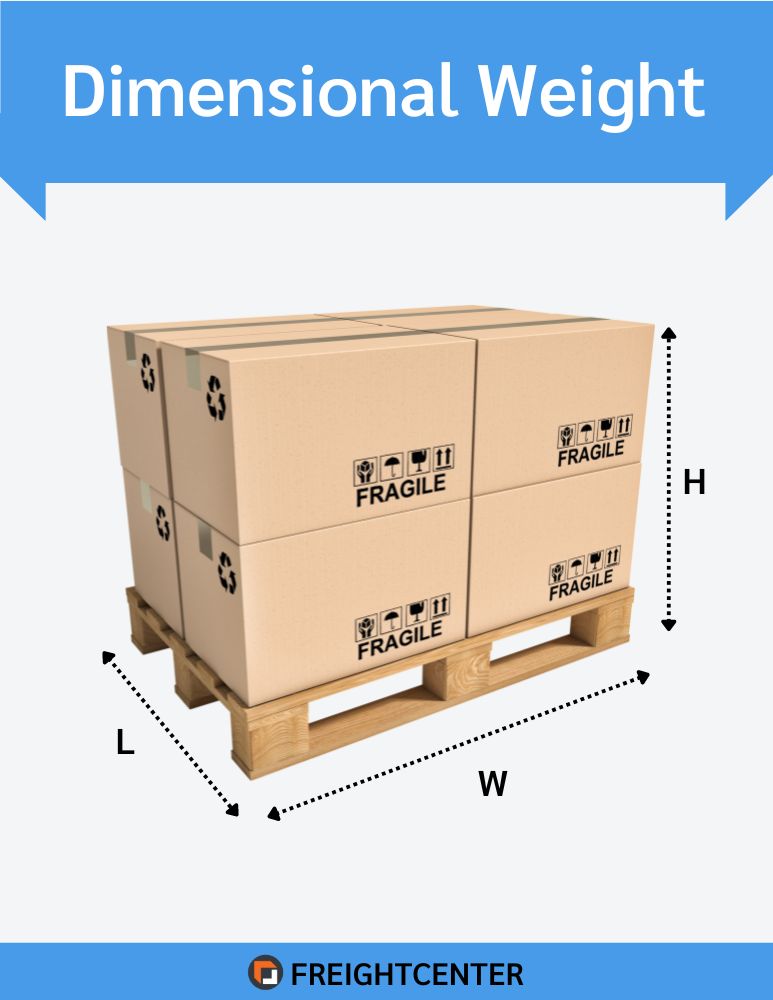
Dimensional Weight vs Actual Weight for Shippers
Master your shipping costs with our guide on Dimensional Weight vs Actual Weight! Learn which method saves you more, optimize your packaging, and reduce expenses. Start shipping smarter today!
Dimensional Weight VS Actual Weight
Actual Weight is exactly what the product weighs, including packaging.
Dimensional Weight considers a package’s volume by looking at its length, width, and height.
Dimensional weight is also called volumetric weight. This variable allows shipping companies to account for the box’s space during transit. This number is calculated using the package’s dimensions, like length, width, and height. This calculation does not apply to all shipments and is reserved for larger lightweight packages or freight. Keep in mind that different carriers have different dimensional weight rules for calculation. There is no need to sweat this requirement, as your FreightCenter agent will ensure you follow your carrier’s regulations and guidelines. Providing these details will give you a clearer understanding and a more accurate price quote.
Dimensional weight is just as crucial as an actual weight when shipping freight. Calculating dimensional weight vs. actual weight can help solve various shipping problems. Freight weight calculates differently than weight for parcel shipping, but how exactly do we determine freight weight? Well, it depends on the carrier. Some carriers use dimensional weight (DIM) for billing, and others use actual weight. With the different ways carriers determine freight weight, you may wonder what the difference is and why shippers need to know.
Here’s help clarifying dimensional weight vs. actual weight for shippers, what they are, and what you need to know.
Why Choose Us For A Freight Quote?
- Shipping quotes anytime
- Get freight shipping quotes to anywhere in the U.S. & Canada.
- Unbeatable discounts on your freight LTL, truckload, rail, air, and more
- Automated Freight tracking, paperwork & invoices
- Manage all quotes & shipments in one place
- 24+ years of logistics experience working for you!
Thousands of businesses trust FreightCenter to move their freight faster, smarter, and cheaper! From unbeatable rates to top-notch service, our customers are raving about their shipping success.
See why they keep coming back!
Award-Winning Service, Trusted by Shippers Everywhere!
- 2021, 2017 & 2016 Food Logistics’ Top Green Providers
- 2021 & 2018 Supply & Demand Chain Executives’ Pros to Know: Matthew Brosious
- 2020 & 2019 Top Food Logistics’ 3PL & Cold Storage Provider Award
- 2020 & 2019 Business Observer’s Top 500 Companies on the Gulf Coast
- 2020 & 2017 SmartWay® Transport Partner
- 2020 & 2017 Food Logistics’ Champions: Rock Stars of the Supply Chain
- 2020 Best of Palm Harbor Awards for Local Businesses
- 2017 Green Supply Chain Award from Supply & Demand Chain Executive
- 2017 Tampa Bay Business Journal Heroes at Work
- 2016, 2015, & 2012 Food Logistics Top 100 Software and Technology Providers
- 2013 Tampa Bay Business 100 by Tampa Bay Business Journal
- 2013 Top 100 Great Supply Chain Partners by SupplyChainBrain
- 2012 TIA Samaritan Award Honorable Mention
- 2012, 2011 & 2010 TBBJ Fast 50 Recipient
- 2013, 2011, & 2010 Diversity Business Top Businesses

Partner with a 3PL like FreightCenter
What’s a shipper to do to ensure a successful outcome? Partner with a third-party logistics company (3PL) like FreightCenter and get all the insight into how carriers ship your freight, including how they determine the shipping cost. Find the suitable carrier for the best rates with our extensive network of carriers and use our powerful TMS that streamlines the process for you.
Refrain from letting freight weight confuse you or keep you from shipping your cargo. Let our experts answer your freight shipping questions by calling us at 800.716.7608. You can also use our free online quote tool!
Choosing FreightCenter
When you choose to work with us, you are choosing to make your shipping process seamless. Here are just some of the benefits working with our Third Party Logistics company will have on your shipping experience:
- When you partner with FreightCenter, a premier 3PL (Third Party Logistics) company with over twenty-four years of experience within the logistics industry, you are choosing success. Over the decades, our team has dealt with nearly every shipment imaginable. There is no shipment process we cannot help you with!
- FreightCenter employs a knowledgeable staff always willing to learn and grow with industry changes and advancements. We are ready to answer any questions you have throughout the entire process!
- We act as the middleman between you and your carrier; you do not have to worry about playing phone tag with your trucker. Your agent will directly communicate with you and your carrier, delivering any necessary information or updates between you.
- We secure the best transit carrier and route for you at the best price. There is no need to spend hours figuring out the logistics or searching for a worthwhile deal.
- We make it easy to ensure your shipments by guiding you toward the best providers. Whether you need full or partial coverage, we have you covered!
- We arrange the pickups and drop-offs while also making sure to track each shipment in transit. This ensures that you know where your packages are every step of the way!
Now what are you waiting for? Call FreightCenter to set up your account and discuss your shipment. We are ready to answer your questions and provide solutions! Our team looks forward to partnering with you.
How to Calculate Dimensional Weight
DIM weight is sometimes referred to as volumetric weight. Having learned a lesson from their colleagues in the air freight business, LTL freight carriers have increasingly used DIM weight. When calculating cost, DIM weight considers a package’s length, width, and height. If the box is 15 inches long, 20 inches wide, and 18 inches high, multiply 15x20x18 to 540 cubic inches.
A carrier will calculate the DIM weight by dividing the cubic volume by a factor it calls “the divisor.” Each carrier uses its divisor (or set of divisors), so the DIM weight for one carrier may not be the same as the DIM weight for another carrier. Some carriers publish the divisors they use for different types of shipments so that a shipper can determine the DIM weight for that carrier. These dimensional factors represent the density allowed per unit of volume. The factor 139 (inches) is often used for domestic and 5000 for international shipments (centimeters). The resulting calculations calculate the billable weight.
Ultimately, you will want to know whether or not a carrier uses DIM weight. Odd as it may seem, it’s possible to book a shipment based on actual weight and have the carrier bill based on DIM weight if it is more than the actual weight. Remember that carriers compare the actual weight to dimensional weight, and whichever is greater determines the shipping cost—doing so accounts for when lightweight yet bulky items occupy significant space.
To create value for our customers by delivering customized shipping solutions that meet their unique needs and to fulfill shipping demands from simple to complex with expertise, guidance and ingenuity.
LTL shipping involves combining multiple small shipments from different customers onto one truck, allowing each customer to share the shipment cost. Trust the experts at FreightCenter to give you the best prices and the most comprehensive options for all your LTL freight shipping needs.
FreightCenter offers Full Truckload (FTL) services for shippers looking to move large, oversized, or high-value freight.
Nationwide Expedited Trucking services move your freight securely and rapidly. Your freight requires fast delivery; our freight shipping experts can get your shipment fast, whether in one large box or a full truckload.
The most reliable Specialized Freight Services rates from all the top carriers are just a few steps away. From white glove service to international shipping, we've got you covered.

Dimensional Weight vs. Actual Weight FAQ
Q. What is dimensional weight?
Dimensional weight, also known as volumetric weight, is a calculation that considers the package’s dimensions (length, width, and height) to determine its weight for shipping purposes. It is used to account for the space a package occupies during transit.
Q. How is dimensional weight calculated?
Dimensional weight is typically calculated by multiplying the package’s dimensions (length x width x height) and dividing the result by a carrier-specific factor called “the divisor.” Different carriers may use different divisors for their calculations.
Q. What is actual weight?
Actual weight refers to the physical weight of a package, including its contents and packaging. It is determined by using a scale and is typically measured in pounds or kilograms.
Q. Do all shipments use dimensional weight?
No, dimensional weight calculations are primarily applied to larger lightweight packages or freight shipments. Smaller, denser packages usually have their shipping costs determined by their actual weight. It will depend on the carrier selected as well.
Q. How do carriers determine the billing weight for a shipment?
Carriers compare a package’s actual and dimensional weight and bill the higher of the two. This accounts for situations where lightweight but bulky items occupy significant space during transit.
Q. Can I save on shipping costs by optimizing dimensional weight?
Yes, optimizing dimensional weight can help reduce shipping costs. Shippers can achieve this by minimizing empty space in packaging, using appropriate box sizes, and efficiently arranging items to maximize space utilization.
Q. Are dimensional weight rules consistent across all carriers?
No, different carriers may have their own dimensional weight rules, including varying divisors and calculation methods. Shippers should familiarize themselves with the rules of the specific carrier they are using for accurate calculations or contact FreightCenter for assistance.
Q. How can a third-party logistics company (3PL) assist with this?
3PLs like FreightCenter can provide expertise in carrier practices, help shippers navigate dimensional weight rules, find suitable carriers at competitive rates, and streamline the shipping process for efficient and cost-effective logistics operations.
Advantages of Using FreightCenter:

Extensive Carrier Network
FreightCenter provides access to numerous regional and national freight trucking companies, ensuring a broad selection of carriers to choose from, thereby enhancing the probability of locating the ideal one for your shipment.

Competitive Rates
FreightCenter provides cost-effective shipping rates for transporting sheet metal, allowing you to save money on your shipping expenses.

Expertise in Specialty Shipments
With a skilled team, FreightCenter demonstrates expertise in managing specialty shipments. Whether your shipping demands call for a flatbed, RGN, or step deck, FreightCenter is well-equipped to meet your distinct requirements.


